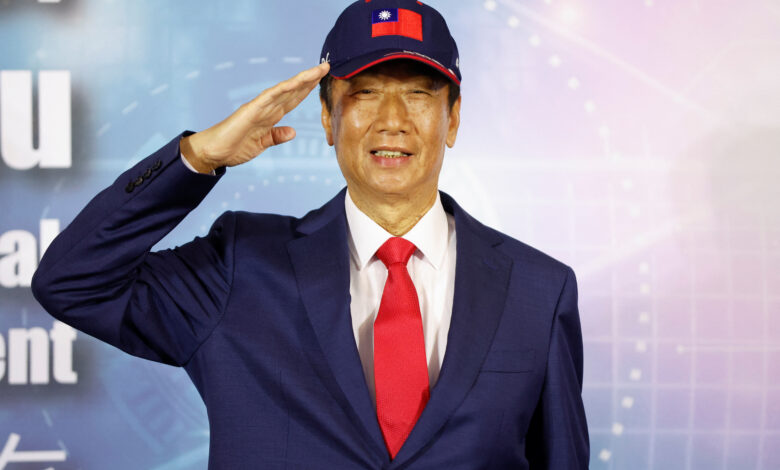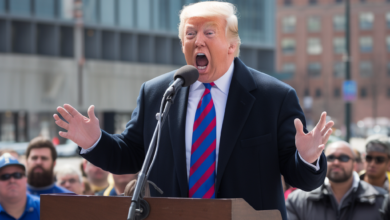
Terry Gou, the 72-year-old billionaire and mastermind behind iPhone manufacturer Foxconn, has officially entered the race for Taiwan’s presidency.
Gou’s charismatic business acumen, his meteoric rise from humble beginnings, and his substantial wealth have thrust him into the spotlight. However, Gou’s path to power is paved with challenges and potential pitfalls that could reshape Taiwan’s political landscape.
Observers in the bustling city of Taipei have been abuzz with chatter about Gou’s bid for the presidency. If he were to stand alone against the governing Democratic Progressive Party (DPP), insiders say Gou would stand a fair chance of success. However, Taiwan’s political scenario is far from simple. With two opposition candidates already jostling to unseat the incumbent DPP, Gou’s entry could split the opposition vote into three factions, making the uphill battle even steeper.
The analogy of the “law of holes” seems to aptly describe the situation. When you find yourself in a challenging situation, the first step is often to stop making it worse. Unfortunately, Taiwan’s opposition appears to be metaphorically digging itself into an electoral hole by further fragmenting its stance.
Gou’s announcement of his presidential candidacy on Monday has sent shockwaves not only through Taiwan but across the globe.
Taiwan, a self-governed island, is poised to select a new leader amidst escalating tensions from China and an increasingly militarized region. Gou’s political journey shares similarities with charismatic business figures in other parts of the world. Like an entrepreneur from across the Pacific, Gou initially sought the nomination of Taiwan’s right-of-center party, the Kuomintang (KMT). However, unlike the United States, Gou’s endeavor met with disappointment.
The KMT, opting for another candidate, led Gou to sever his ties with the party in frustration. Yet, the KMT is just one of Gou’s concerns.
The Taiwan People’s Party (TPP), led by charismatic populist Ko Wen-je, poses another challenge.
Ko, a former mayor of Taipei, holds strong appeal among younger Taiwanese voters and currently ranks second in polls.
Gou’s appeal extends beyond his financial prowess. His business genius transformed Foxconn, known as Hon Hai Industries, into the world’s leading electronics manufacturer. This feat was achieved by synergizing Taiwanese engineering expertise with skilled Chinese labor. The company’s success eventually led Apple to entrust Foxconn with the manufacturing of MacBooks and iPhones, solidifying Gou’s stature as one of Taiwan’s wealthiest entrepreneurs.
Gou’s unique proposition rests on his China experience. His argument hinges on the potential to leverage his extensive business dealings with China to safeguard Taiwan’s security. Gou’s concern for Taiwan’s fate echoes in his words as he endeavors to prevent it from mirroring the path of Ukraine. He vows to steer Taiwan away from the brink of conflict with China.
However, Gou’s perspective on the China threat isn’t singular. Recent years have witnessed heightened military activities by China around Taiwan, causing unease across the region. In a bold display, China’s People’s Liberation Army even released a meticulously crafted propaganda video that depicted a scenario reminiscent of a potential invasion of Taiwan’s shores. The twist lies in Gou’s interpretation – he points fingers not at Beijing, but at Taiwan’s own President Tsai Ying-wen.
Gou attributes the escalating tensions to the incumbent DPP’s strained relations with Beijing. He envisions restoring a previous status quo between Taipei and Beijing from 1992. Moreover, Gou ambitiously claims he can broker a pact that would usher in 50 years of peace for the island.
However, skepticism abounds about the feasibility of such an agreement. Yet, Gou faces a more immediate challenge: electoral math. His stance isn’t resonating well with Taiwan’s electorate. Polls reveal that most Taiwanese don’t hold their government responsible for the tensions with China. They remain steadfast in protecting their sovereignty and are wary of making concessions to Beijing for the sake of peace. The sentiment is grounded in a strong identification as Taiwanese rather than Chinese, with many expressing a willingness to defend their homeland.
Survey results also underscore that around 40% of voters steadfastly support the DPP. While this signals vulnerability for the ruling party, the opposition’s chances hinge on unity around a single candidate. Gou believes that candidate should be him. Drawing a parallel to the tale of the three little pigs, he urges the opposition to band together against the “big bad wolf” of the DPP.
Yet, the prospect of this unity appears elusive. Despite Gou’s financial resources and prominence, his candidacy might inadvertently splinter the opposition further. As a consequence, even with just 40% of the vote, the DPP’s William Lai could emerge as the most likely successor to Taiwan’s presidency.
As Taiwan’s electoral drama unfolds, it serves as a vivid reminder that the road to power is often a complex journey riddled with unforeseen challenges and strategic decisions. Gou’s foray into politics, while capturing attention, paints a portrait of a divided opposition grappling to navigate its way through an intricate political landscape. And as the election date inches closer, all eyes remain fixed on Taiwan’s democratic dance, uncertain of the ultimate victor who will steer the island’s future.





